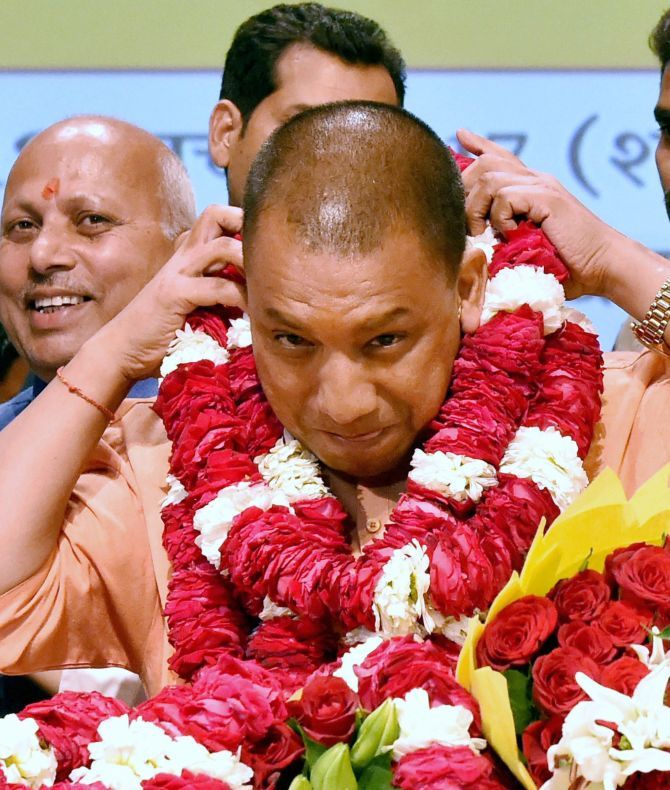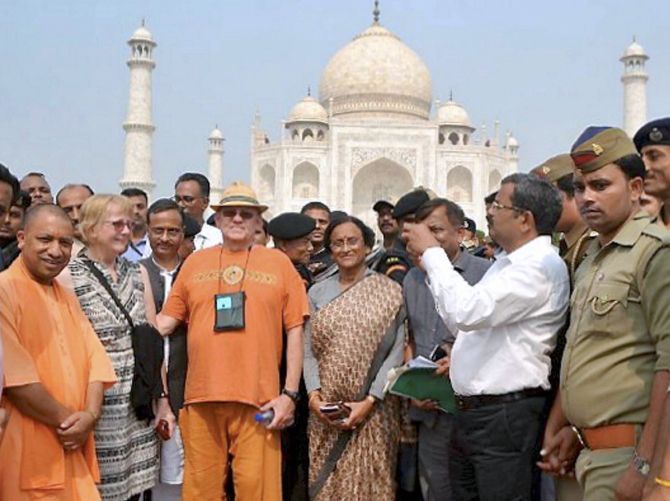'The BJP is not the party it was 10 years ago. It has changed. It is emerging like the Congress.'
'Sometimes, I feel the BJP has taken the Congress' space.'
'Its politics is also resembling the Congress.'

A rare statue of Uttar Pradesh's towering first chief minister Gobind Ballabh Pant stands inside the institute of social sciences named after him in Allahabad.
On a quiet and unusually hot Sunday afternoon for this time of the year, Professor Badri Narayan, director of one of the country's premier research institutes, has made time to explore the terrain of Indian politics on his day off during the Diwali weekend.
A respected voice in the field of marginalised communities, cultural studies and narrative study, Badri Narayan's scholarship marks a significant contribution in the study of Indian politics.
His recent book Fractured Tales: Invisibles in Indian Democracy, looks at how the dominant and stronger Dalit castes have reaped the benefits of democarisation due to the Dalit movement, but the more marginalszed amongst the Dalits remain neglected.
Badri Narayan -- who has also been the Smuts Fellow at Cambridge; a Fulbright Senior Fellow; visiting professor at the Massion De Sciences De La Homme, Paris and a professor at Jawaharlal Nehru University -- spoke with Rediff.com's Archana Masih at his office in Allahabad.
What do you see as the current rhetoric behind the Taj Mahal?
One method of the BJP's mobilisation has been giving a brand identity to pilgrim centres. Pilgrim centres are linked to identity. Like Ayodhya is part of the Hindu identity.
You may ask: Why Yogi Adityanath went to the Taj Mahal? Some identity markers can't be ignored. They are part of national identity.
Identities have labels -- like caste identity, religious identity and national identity.
You have to include the Taj Mahal as part of national identity.
Yogi Adityanath countered what Sangeet Som said about the Taj Mahal (Som, a BJP MLA from UP called the Taj 'a blot on Indian culture').
But Adityanath also removed the Taj from UP tourism brochures. Many in the BJP are uncomfortable about India's Islamic past.
If there is an identity symbol that makes you uncomfortable and you have to accept it, you have to make an argument.
And the argument is that it is made by our labourers and hence it is our creation. That it is a creation of the Indian nation.
By saying it was made by Indian labour, Yogi Adityanath made the Islamic identity secondary.
This is the politics of discourse. We do not make a value judgement, but as social scientists we look at the craft of the discourse, and it is a very efficiently carved discourse by Yogi Adityanath.
If he is linking it to the national identity and to Indian labourers, then it is something that many poets have also said in the past that the Taj is made by Indian labourers.
So the BJP has accepted the Taj, but on different grounds.
When the Opposition says that its Islamic identity is being ignored, this further deepens Hindu polarisation.
Isn't polarisation already deeply entrenched?
The success of a rightist of leftist regime depends on how it appropriates and assimilates symbols that have historically made them uncomfortable.
I see the BJP politics as the politics of assimilation.
The BJP cannot speak the language it did while in the Opposition when it is in power.
When a party comes to power, it has to have a larger heart and it has to bring changes to its old arguments.
What changes have you seen in the BJP of the Opposition and the BJP in power?
One big change is that they are the ruling party. They are ruling a multi-religious, multi-cultural, multi-community, multi-identity State.
Their language cannot be like what it was when they were in the Opposition. The discourse has to change and it is changing.
The characteristics of the BJP have also changed. It is no longer the party of 2, 3 higher castes, an urban-based party. They are including many other castes and communities.
Earlier, there were no Dalits, but in the last election the Dalits abandoned Mayawati and voted BJP.
Shias have voted for the BJP in the past, but this time Muslim women have also voted for them. There is no data to prove this, but we have heard this.
Some say this is a crafted discourse, but triple talaq must have had some impact.
Even if they get 1% vote of Muslim women, it is a big shift.
The BJP is also changing day by day. It is trying to assimilate as far as possible the communities and castes they were not comfortable with before.
RSS pracharaks now say that they are not talking of Hindus alone, but want the whole nation to be with them.
The RSS is a Hindutva organisation no doubt. Its goal is a larger Hindu society that includes all Hindus. It wants to end the fragmentation of Hindu society.
They also want people from other faiths to join them. If they want to achieve this, they will have to change their discourse, change their symbols and the treatment of those symbols.
They are trying to do this -- like trying to include Lal Bahadur Shastri to their narrative. They are trying to include Ram Manohar Lohia. That's why I call it the politics of assimilation -- to assimilate the uncomfortable identities.
Is this assimilation focused on gathering votes or the larger national interest?
The politics of democracy is largely connected to votes. But the politics of votes also brings about change in political parties.
Then they have to give representation -- like Yogi Adityanath made a Muslim minister.
It was unexpected that there would be a Muslim minister when the BJP did not give a single ticket to Muslims in the UP election, but they had to change.
Who knows, there could be a Christian minister in the future?
The politics of democracy is guided by voting, but in the process it also changes parties.
The BJP is not the party it was 10 years ago. It has changed. It is emerging like the Congress.
Sometimes, I feel the BJP has taken the Congress' space. Its politics is also resembling the Congress.
What it has that the Congress doesn't is the support and strength of the Sangh (the RSS).
The Sangh imparts strength and influences the BJP.
There is no one to control the Congress. It has no mother organisation. This can both be a problem or an opportunity for the Congress.

Has Adityanath made a constituency of his own in politics?
Yes. After Modi and Amit Shah, the next big leader is Yogi Adityanath.
His support is being garnered by the BJP in Gujarat and Kerala. He is emerging as a big symbol.
What are the Modi government's achievements and failures?
In my interaction with village folk, the Ujjwala Yojna comes across as a success in terms of appeal.
The other observation on the ground is that people are upset about GST. GST can pose some danger for the BJP.
What impact do you think GST will have on the Gujarat election?
People are upset with GST in Gujarat too, but how much will this reflect on the election, one can't say, because elections are won on very different issues. They are rarely won on economics.
Modiji is a big symbol of Gujarati identity for the Gujaratis. He is the prime minister and he is from their state.
Gujarati pride may overshadow the issue of GST.
When two symbols collide, the bigger symbol has an upper hand.
If people thought of economics while queuing up to cast their vote...
... then the BJP would not have won the UP election after demonetisation?
I am not saying this, you are (laughs).
People were upset with demonetisation, but they still voted for the BJP. The reality is different, but the reflection of that reality is different in the ballot box.
It shows that there are other things at work along with the environment that the media creates.
Earlier I used to think people vote irrespective of the environment created by the media, but now I have realised that the media is a very important part in political play and political parties like to influence the direction of the media during a poll campaign.
Do you think with voices of dissent emerging from the Sangh Parivar/ senior BJP leaders and dissatisfaction with GST among traders, an anti-Modi sentiment is being seen that was not there up till now?
It is fragmented. You will see people who are disappointed in him and there are others who continue to chant his name.
The difference now is that people are getting vocal in voicing disappointment.
Economics can play a role in polarising people, but whether it will be a factor when people cast their vote can't be said.
Economic discontentment becomes secondary to emotions, identity and pride issues when it comes to giving a vote.
How long will the politics of polarisation work? The consolidation of the Hindu vote has resulted in the electoral marginalisation of the Muslims.
The consolidation of the Hindu vote will happen, but there will be a lessening of the marginalisation of Muslims by the BJP.
They will try to assimilate the Muslims in elections to come and maybe tickets will be given to Muslims.
The second phase of politics is yet to come.
In the first phase the BJP has shown that it can do politics without the Muslims.
In the second phase, if the BJP wants to gain stature and widen its political reach, it will need to show that Muslims are also ours.
This is what I feel. I am not saying it will happen.
This is a shift that I see, it was not evident in the recent past.
Now the BJP feels whether it gets Muslim votes or not they are part of our State and we have to include them too.
Hindu consolidation will not always remain intact.
That can also be torn apart and the BJP will have to form another base.
Echoes that are heard on the ground directs the policy making of political parties and that indicates that the politics of the next election will see Muslims being included in the BJP.
The second phase of politics will be about assimilating everyone.
Every caste, creed, religion and community.
How do you assess the terrain of Indian politics as we move towards the general election of 2019?
There is still some time before the election.
When a fresh election is on the anvil, anything can happen at any time.
Things can change even a week before the election date, or nothing can change at all even a year prior to the election.
That is why it is difficult to say what will happen.
The biggest challenge for Modiji and the BJP is to keep the BJP stable.
In the current situation, they have an edge. The biggest problem is whether a credible Opposition can be formed in these one-and-a-half years. Nothing suggests that is happening so far.
The poll atmosphere seems to be picking up with Rahul Gandhiji's Gujarat campaign.
If the Opposition unites and throws up a viable alternative, then the election will be a hard fought one.
If that doesn't happen, then we will see a continuation of what we have been seeing so far.
Do you think the prime minister can call an early general election, maybe 6 months ahead of schedule?
He can do that. The BJP is very aggressive in mobilising people. They have the support of the cadre-based RSS, which is a big strength to have for a political party.
Every year the RSS produces 1.5 lakh people; in 10 years that amounts to 15 lakh.
The BJP has an edge, but in one-and-a-half years anything can happen. It does not take much time for the political climate to change.
Politics is the name of possibilities, after all.
Seeing how the Opposition has functioned since 2014, do you think it can get its act together in the year-and-a-half?
The Opposition has not been impressive. It has been temporarily visible. You see it sometimes and then you don't.
You think they have it in them to take up this challenge if they haven't so far?
They can do it. In Indian politics, the State hinges its political campaign on its work record. It has the opportunity to continue its campaign because of the programmes it rolls out.
The Opposition, on the other hand, does not always have the space for publicity or to build its agenda or do its politics.
They can only attack the government if they find some negatives in the government's policies. Sometimes they also have to appreciate what the government does.
There are also benefits in showing appreciation of the government's work.
Like Atal Bihari Vajpayee during the Bangladesh war. His appreciation of Indira Gandhi's government added to his stature and benefited the BJP (then the BJP's parent, the Jan Sangh) in the long run.
If Rahul Gandhi supports a good move of Modi, it is possible that it may benefit Rahul Gandhi too.
The Opposition only supports a programme of the State when it feels that it has a moral presence among the people of the country.
The Opposition can only do three things -- attack, appreciate or keep quiet.
Most of the time, the Opposition comes into its own and is formed during an election. Like the Mahagatbandhan which changed the Bihar election.
Mayawati recently said that the situation in the country is 'worse than Emergency'? Do you feel there is an environment of fear that prevents people from saying what they feel.
There is no indicator to measure fear. It exists in subtle ways in the social and political fabric. I have no concrete evidence to say it exists or not.
I don't feel it is like the Emergency. The politics of media control happens regardless of who is in power. Some political parties are more organised and adept than the others.
Maybe the Congress wasn't very organised and was unable to control the media. Even when it was in power and during the election a lot was written against it.
It had become like an army that only ate and slept and had forgotten how to fight.
Nitish Kumar in Bihar mobilised the media during the Bihar election and continues to do so.
The media says what it wants to say. If some channels don't say it, others do.
If the media is not speaking about certain things, then those who are in the Opposition should speak again and again.
If you repeat one thing ten times, it becomes the truth even if it is not true.
A competent leader repeats something so many times that it becomes a memory.
Modiji has mastered that art. He repeats the same story in the same way that it becomes a big reality. The Opposition should learn this art.
What changes have you seen in Rahul Gandhi in the last few months?
His speeches in Gujarat and interactions in America have been praised. If his interventions continue for one-and-a-half years it will benefit the Congress.
What do you think about the prospects of revival for the Congress?
The Congress revival depends on the revival of its leaders.
The party has lost its base vote. It is to be seen who will vote for the Congress.
It is in a better position than what it was in the 2014 election.












 © 2025
© 2025